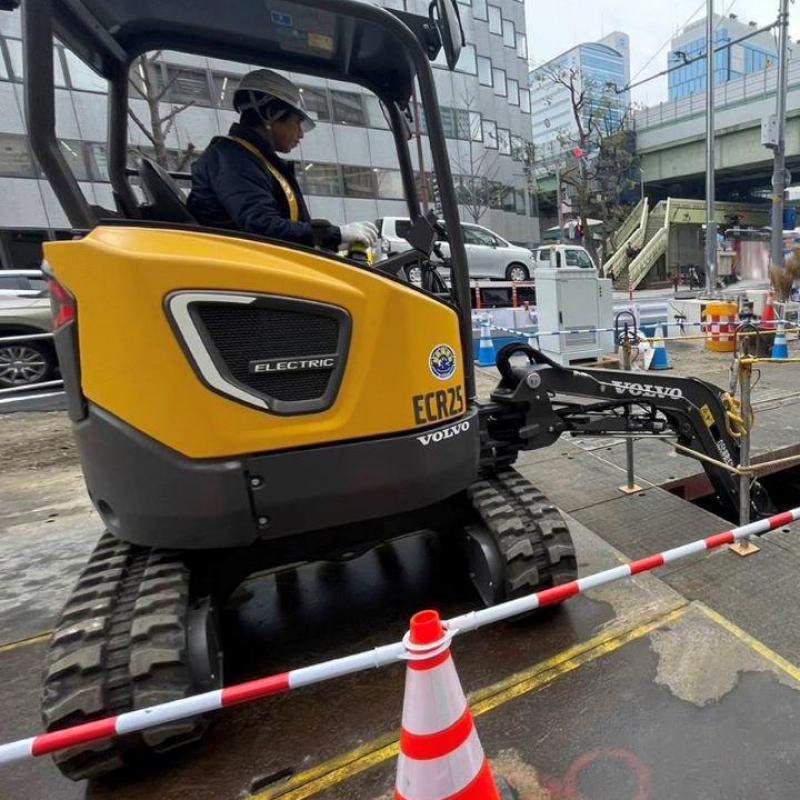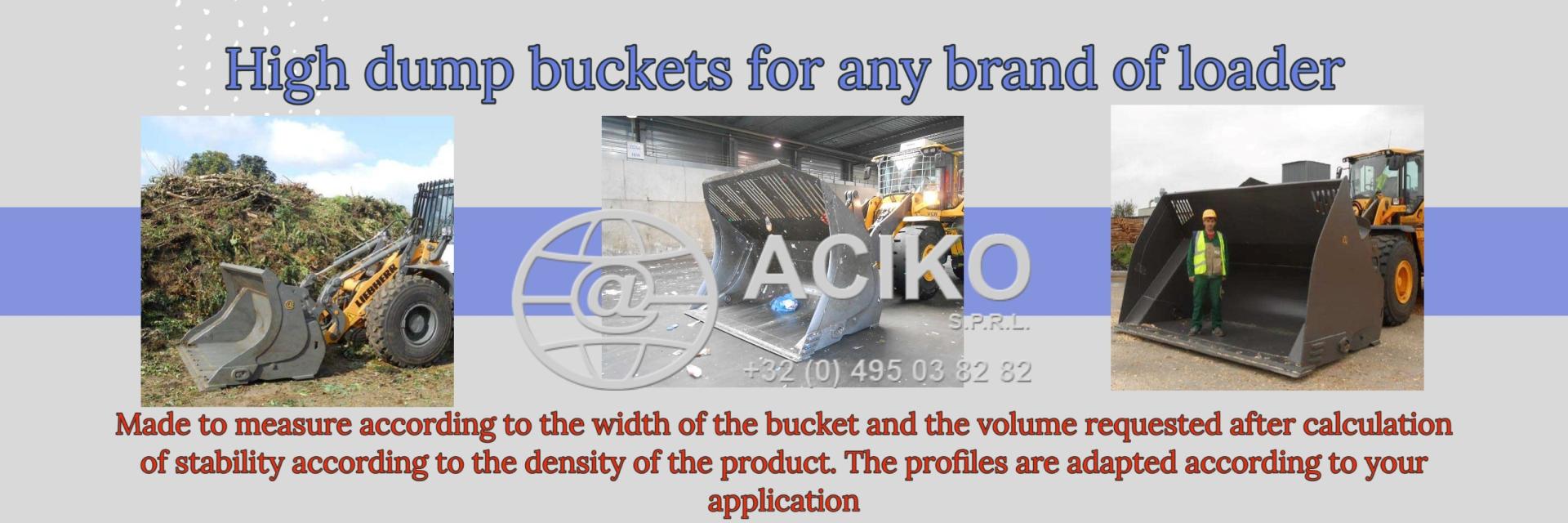R.E.News International-VolvoCE Electric Machinery delivering efficiency and sustainability in Japan
 17/07/24-FR-English-NL-footer
17/07/24-FR-English-NL-footer
Les machines électriques VolvoCE offrent efficacité et durabilité au Japon
 Image- Volvo Construction Equipment
Image- Volvo Construction Equipment
Les machines électriques de Volvo Construction Equipment gagnent du terrain dans toute l'Asie et le nombre d'unités installées sur les chantiers augmente.
Le projet le plus récent bénéficiant de cette machine révolutionnaire est son installation opérationnelle sur la ligne ferroviaire urbaine Naniwa-suji à Osaka, où l'entrepreneur Zenitaka-Gumi utilise une pelle électrique ECR25 louée auprès de Nishio Rent-All, qui est fournissant également un support après-vente et de service complet. Le Japon s'est fixé pour objectif de réduire ses émissions de dioxyde de carbone de 60 % d'ici 2035, et les machines zéro émission jouent un rôle extrêmement important dans la promotion du développement durable, tant au niveau de l'entreprise qu'au niveau national.
Lors de la construction de la station Nishi-Honmachi sur la ligne Naniwa-suji, l'ECR25 Electric a été installé comme principal outil d'excavation pour ce projet, y compris l'excavation de terre et de sable, et a démontré des performances et une efficacité remarquables. Le succès de cette machine a contribué au succès du projet, en renforçant le réseau ferroviaire, en améliorant l'accès à l'aéroport international du Kansai et à la gare de Shin-Osaka, en construisant une nouvelle gare, ainsi qu'en créant un nouvel axe qui facilitera le développement urbain le long de la frontière. doubler.
Dans le même temps, comme le projet se déroulera dans un paysage urbain parsemé de zones résidentielles, la sécurité, le bruit et la gestion du trafic sont autant de considérations importantes, réduisant les émissions de CO₂ et la pollution sonore et minimisant l'impact sur l'environnement. Fonctionnant six jours par semaine, cinq heures par jour, l'unité est extrêmement fiable et robuste.
Le groupe Zenitaka a déclaré : « La Volvo ECR25 Electric a joué un rôle déterminant dans l'optimisation de nos processus, en particulier pour surmonter les défis du paysage unique de cette ville, et ses performances et son efficacité exceptionnelles ont non seulement contribué au succès de ce projet, mais également à notre respect de notre engagement envers des pratiques de construction durables. Le projet a été un grand succès. Grâce à notre partenariat avec Volvo Construction Equipment, nous réaffirmons notre engagement en faveur d'une construction responsable, en minimisant l'impact environnemental tout en maximisant l'efficacité opérationnelle.
Volvo Construction Equipment poursuit son objectif de réduire les émissions de CO₂ de 40 % d'ici 2040. Cet engagement est également aligné sur l'engagement du groupe Volvo envers les Science Based Targets.
La pelle électrique ECR25 est une machine d'une capacité de 2,6 à 2,8 t et d'une force d'écrasement de 22,3 kN. Il est équipé d'un chargeur embarqué pour la recharge générale, d'un chargeur rapide externe (en option pour une utilisation intérieure/extérieure) et d'une batterie de 20 kWh, qui permet 3 à 4 heures de travail par charge. La machine est livrée avec un chargeur standard intégré et un chargeur rapide autonome en option pour une utilisation intérieure/extérieure.
NJC.© Info Volvo Construction Equipment
--------------------------------------------------------------------------------------------------------------------
 17/07/24-English
17/07/24-English
VolvoCE Electric Machinery delivering efficiency and sustainability in Japan
 Image- Volvo Construction Equipment
Image- Volvo Construction Equipment
Volvo Construction Equipment’s electric machines are gaining momentum throughout Asia, and the number of units being installed on job sites is increasing.
The most recent project to benefit from this ground-breaking machine is its operational installation on the Naniwa-suji urban rail line in Osaka, where the contractor, Zenitaka-Gumi, is using an ECR25 Electric excavator rented from Nishio Rent-All, which is also providing full after-sales and service support. Japan has set a goal of reducing its carbon dioxide emissions by 60% by 2035, and zero-emission machines play an extremely important role in promoting sustainability, both at the corporate and national levels.
In the construction of Nishi-Honmachi Station on the Naniwa-suji Line, the ECR25 Electric has been installed as the main excavation tool for this project, including the excavation of earth and sand, and has demonstrated remarkable performance and efficiency. The success of this machine has contributed to the success of the project, strengthening the railroad network, improving access to Kansai International Airport and Shin-Osaka Station, constructing a new station, as well as creating a new axis that will facilitate urban development along the line.
At the same time, because the project will take place in an urban landscape dotted with residential areas, safety, noise, and traffic management are all important considerations, reducing CO₂ emissions and noise pollution, and minimising the impact on the surrounding environment. Operating six days a week, five hours a day, the unit is highly reliable and robust.
The Zenitaka Group, said: “The Volvo ECR25 Electric has been instrumental in optimising our processes, especially in overcoming the challenges of this city’s unique landscape, and its outstanding performance and efficiency have not only contributed to the success of this project, but also to our compliance with our commitment to sustainable construction practices. The project has been a great success. Through our partnership with Volvo Construction Equipment, we are reaffirming our dedication to responsible construction, minimising environmental impact while also maximising operational efficiency.”
Volvo Construction Equipment is continuing towards its goal of reducing CO₂ emissions by 40% by 2040. The commitment is also aligned with Volvo Group’s commitment to Science Based Targets.
The ECR25 Electric excavator is a machine with a capacity of 2.6 to 2.8 t and a crushing force of 22.3 kN. It is equipped with an on-board charger for general charging, an external quick charger (optional for indoor/outdoor use), and a 20 kWh battery, which allows for 3 to 4 hours of work per charge. The machine comes with an on-board standard charger and an optional stand-alone fast charger for indoor/outdoor use.
NJC.© Info Volvo Construction Equipment
--------------------------------------------------------------------------------------------------------------------
 17/07/24-NL
17/07/24-NL
VolvoCE Electric Machinery levert efficiëntie en duurzaamheid in Japan
 Image- Volvo Construction Equipment
Image- Volvo Construction Equipment
De elektrische machines van Volvo Construction Equipment winnen aan populariteit in heel Azië en het aantal eenheden dat op bouwplaatsen wordt geïnstalleerd, neemt toe.
Het meest recente project dat van deze baanbrekende machine profiteert, is de operationele installatie ervan op de stedelijke spoorlijn Naniwa-suji in Osaka, waar de aannemer, Zenitaka-Gumi, een ECR25 elektrische graafmachine gebruikt die is gehuurd van Nishio Rent-All. biedt ook volledige after-sales- en serviceondersteuning. Japan heeft zich ten doel gesteld de uitstoot van kooldioxide tegen 2035 met 60% te verminderen, en emissievrije machines spelen een uiterst belangrijke rol bij het bevorderen van duurzaamheid, zowel op bedrijfs- als op nationaal niveau.
Bij de bouw van het station Nishi-Honmachi aan de Naniwa-suji-lijn is de ECR25 Electric geïnstalleerd als het belangrijkste graafgereedschap voor dit project, inclusief het uitgraven van aarde en zand, en heeft opmerkelijke prestaties en efficiëntie aangetoond. Het succes van deze machine heeft bijgedragen aan het succes van het project, door het spoorwegnetwerk te versterken, de toegang tot Kansai International Airport en Shin-Osaka Station te verbeteren, een nieuw station te bouwen en een nieuwe as te creëren die de stedelijke ontwikkeling langs de rivier zal vergemakkelijken. lijn.
Omdat het project zich zal afspelen in een stedelijk landschap vol woonwijken, zijn veiligheid, geluid en verkeersmanagement tegelijkertijd allemaal belangrijke overwegingen, waardoor de CO₂-uitstoot en geluidsoverlast worden verminderd en de impact op de omgeving wordt geminimaliseerd. De unit werkt zes dagen per week, vijf uur per dag en is zeer betrouwbaar en robuust.
De Zenitaka Group zei: “De Volvo ECR25 Electric heeft een belangrijke rol gespeeld bij het optimaliseren van onze processen, vooral bij het overwinnen van de uitdagingen van het unieke landschap van deze stad, en zijn uitstekende prestaties en efficiëntie hebben niet alleen bijgedragen aan het succes van dit project, maar ook aan onze naleving van onze inzet voor duurzame bouwpraktijken. Het project is een groot succes geweest. Door onze samenwerking met Volvo Construction Equipment herbevestigen we onze toewijding aan verantwoord bouwen, waarbij we de impact op het milieu minimaliseren en tegelijkertijd de operationele efficiëntie maximaliseren.”
Volvo Construction Equipment blijft zijn doel bereiken om de CO₂-uitstoot tegen 2040 met 40% te verminderen. De inzet is ook in lijn met de inzet van Volvo Group voor Science Based Targets.
De ECR25 Elektrische graafmachine is een machine met een capaciteit van 2,6 tot 2,8 ton en een breekkracht van 22,3 kN. Hij is uitgerust met een ingebouwde lader voor algemeen opladen, een externe snellader (optioneel voor gebruik binnen/buiten) en een batterij van 20 kWh, die per oplaadbeurt 3 tot 4 uur werk mogelijk maakt. De machine wordt geleverd met een ingebouwde standaardlader en een optionele stand-alone snellader voor gebruik binnen en buiten.
NJC.© Info Volvo Construction Equipment
-------------------------------------------------------------------------------------------------------------------
Date de dernière mise à jour : 16/07/2024
















